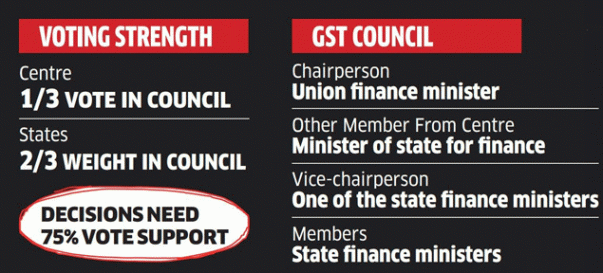- Home
- Prelims
- Mains
- Current Affairs
- Study Materials
- Test Series
 EDITORIALS & ARTICLES
EDITORIALS & ARTICLES
What is the GST Council, and what does it do?
The 47th meeting of the Goods and Services Tax Council began in Chandigarh 28 June 2022, almost marking five years of the tax system coming into effect on 1 July 2017.
Over these five years, the GST setup has gone through numerous changes, and the ongoing two-day meeting is expected to look at matters such as the GST compensation to states, and the imposition of taxes on some currently-exempt goods and services.
What is the GST Council?
The Goods and Services Tax regime came into force after the Constitutional (122nd Amendment) Bill was passed by both Houses of Parliament in 2016. More than 15 Indian states then ratified it in their state Assemblies, after which the President gave his assent.
The GST Council – a joint forum of the Centre and the states — was set up by the President as per Article 279A (1) of the amended Constitution.
The members of the Council include the Union Finance Minister (chairperson), the Union Minister of State (Finance) from the Centre. Each state can nominate a minister in-charge of finance or taxation or any other minister as a member.

Why was the Council set up?
The Council, according to Article 279, is meant to “make recommendations to the Union and the states on important issues related to GST, like the goods and services that may be subjected or exempted from GST, model GST Laws”.
It also decides on various rate slabs of GST.
For instance, an interim report by a panel of ministers has suggested imposing 28 per cent GST on casinos, online gaming and horse racing. A decision on this will be taken at the Council meeting on 29 June 2022.
What has changed this time?
The ongoing meeting is the first since a decision of the Supreme Court in May this year, which stated recommendations of the GST Council are not binding.
The court said Article 246A of the Constitution gives both Parliament and state legislatures “simultaneous” power to legislate on GST and recommendations of the Council “are the product of a collaborative dialogue involving the Union and States”. This was hailed by some states, such as Kerala and Tamil Nadu, who believe states can be more flexible in accepting the recommendations as suited to them.
The council’s meeting is also likely to focus on the issue of extension of the GST compensation regime beyond June 2022. This was a special mechanism by which states were assured that their revenues would not be affected by the new GST system. Some states are already demanding that the compensation be continued.
Earlier, the Council had agreed to extend the levy of compensation cess till 2026, but only for repayment of the borrowings made in the aftermath of the pandemic to provide compensation to states.









 Latest News
Latest News General Studies
General Studies